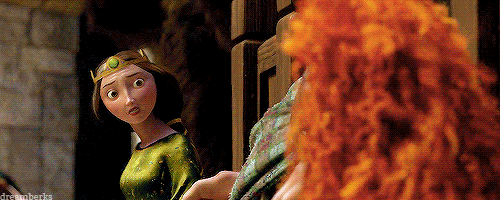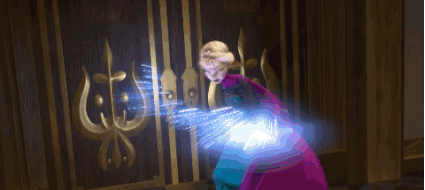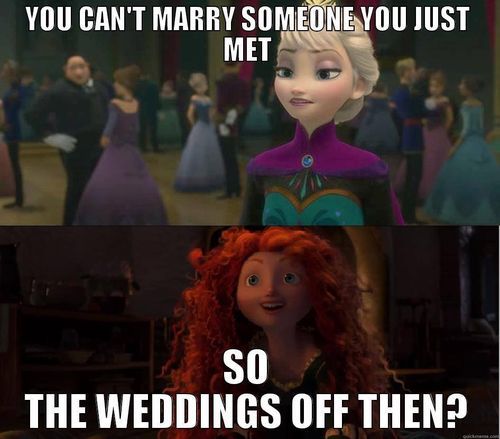So, recently I have seen Disney’s newest contribution: Frozen and, upon discussing it with my peers, was surprised to find that there are some people who prefer it to Disney Pixar’s 2012 film: Brave. Being of the opposite view, I started thinking about both the films and decided to share my thoughts on the matter and, seeing as I have not contributed to my blog in a while, I thought that it would be a good idea to share them here.
There may be spoilers.
Here are some of the thoughts I have been thinking:
The Setting
Brave and Frozen are set in two very different locations: Scotland and Arendelle, a fictional location loosely based on Scandinavia.
The first thing that struck me is that the voice actors for Brave all use authentic accents, consistently throughout the entire film, whereas Frozen does not. I do not know why this decision was made, perhaps the producers thought a Scandinavian accent would be too difficult to be understood? Pure speculation! Importantly, both settings use names which are appropriate to the setting. Brave has surnames such as MacGuffin and Macintosh. Frozen, for example, has a character called Anna, pronounced the Scandinavian way, and other characters such as Kristoff and Olaf share appropriate names. Perhaps in places the names are a little cliché and over the top, especially within Brave, but as a children’s film, this is excusable and serves to enhance the immersion.

Magic
Brave has magic in the form of wisps and witches, and the presentation of this is internally consistent within the film. From the beginning we are shown that wisps exists, but that most people do not believe in them, that they are part of the world’s mythology. The role of wisps, to lead individuals to their fate, is explained from the beginning, so when Merida encounters them later on, we are understand what to expect and they do just as we thought: they guide the plot. The presentation of the witch does not have much explanation, though it does not need it, as nothing she does seems to be inconsistent. She performs a single spell, explaining that she has done so before. Additionally, the wisps and witches remain consistent with figures from Scottish legends and myths.
Frozen however, is more confusing. We have a main character, Elsa, who has magical powers, the source of which is unknown. We are told that she was born with them, rather than cursed, and that she cannot control them if she is afraid. Her powers are established as being related to ice and this is consistent, to a point. During the plot, she uses these powers to create two living creatures from snow, one of which has voice and thoughts: Olaf. Her powers were never shown to be able to do this before and this is not explained. Additionally, she uses them to change her clothing, which is simply inconsistent. A final point about the magic in this film is that Elsa, a character who has never practiced with her powers, is able to construct an intricate palace with very little effort after singing one very simple, yet very good, song. It seems not to fit.
The Central Message
Both the films have a good central message.
Brave is about allowing individual independence, whilst reconciling this with tradition and history. It is a film about fitting in, about how we can still be a part of our history whilst breaking away from it. Core to the film is the relationship between Merida and her mother and importantly, neither one of them is shown as being completely correct. Merida wants to break away from the rules, whereas her mother wants her to completely submit to tradition. In the end, neither one of them gets what they originally wanted, because they both realised the importance of the other’s point of view.
Frozen has an equally important message, about refusing to worry about other people’s opinions of us and to transcend fear. It also contains an important message about family. After all, the demonstration of true love is not the traditional romantic love between a man and a woman, but the sisterly love between Anna and Elsa.
Both films convey equally inspirational messages.

Our Heroines
I will, however, point out the differences between Merida and Anna.
Merida is an excellent female lead, for she is a young girl who is willing to speak out, often and loudly, against what she perceives to be an injustice against her, going as far as to change the very structure of her society. She is out-spoken and strong, though she is far from perfect. When she discovers that there might be a way to change her mother, she jumps for it, so fast and without thinking that she endangers her life. However, she retains her sense of independence and her self-certainty.
Anna, however, is certainly less feminist than many of the films critics seem to think. She is shown as being almost entirely dependent on men throughout the entire film. She dreams of finding a man and, the first time she does, she agrees to marry him. Of course, this does not turn out well, but she does not seem to learn from this mistake. Seconds after Hans reveals his true nature and leaves Anna to die, Anna is already considering Kristoff, the only other man she has truly met, to be her true love. She immediately jumps towards another man, seconds after being betrayed. She is overall too defined by her romantic relations to men.
Elsa, our third heroine (though some might consider her a villain, and I would argue that those people are gravely mistaken), is the only character within Frozen which makes any reasonable development, learning to control her powers. However, this development is exceptionally artificial. She is told as a child to avoid fear, fails to do it her entire life until, after dooming her home to an “eternal” winter (which lasts about two days (forever isn’t so long, after all)) she has a eureka moment, after which everything is fine. Merida takes a film to naturally develop, Elsa does so within the space of 10 minutes.
So, these are some of my thoughts concerning the films. Evidently, I think more highly of Brave than I do of Frozen, though I still like the more-recent film.

No comments:
Post a Comment